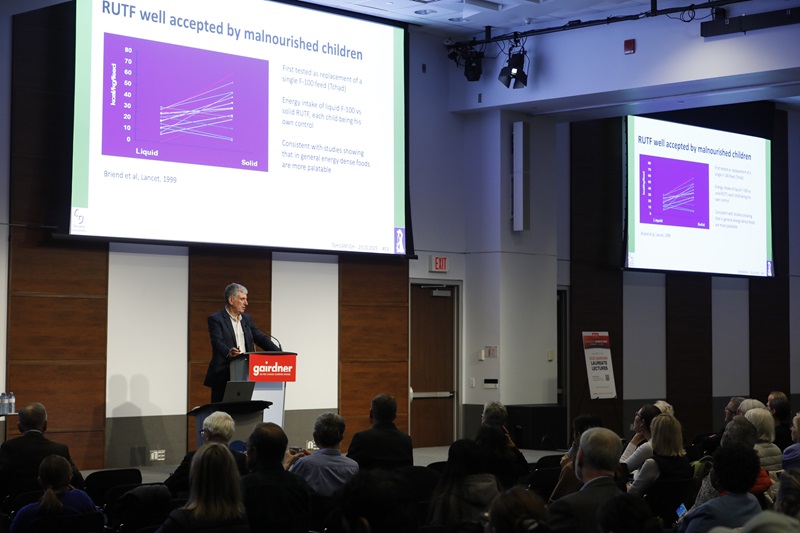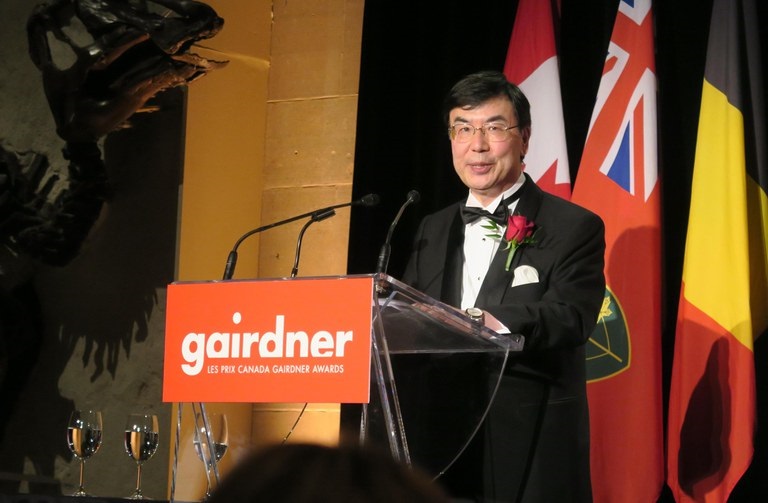Announcing the 2023 Gairdner Early Career Investigators


The Gairdner Foundation is pleased to announce the winners of the 2023 Gairdner Early Career Investigators (ECI) competition.
Annually, the Gairdner Foundation invites early career investigators across Canada to submit an application to present their research as part of Gairdner Science Week events in October. These five investigators have been selected by the 2023 Canada Gairdner Award laureates and will present their research alongside them during Gairdner Science Week 2023 events in Toronto on October 25 and 26. Registration is now open for all events here.
Congratulations to the winners!
Dr. Elena Kuzmin
Canada Research Chair Tier II in Synthetic and Functional Genomics; Assistant Professor, Department of Biology, Centre for Applied Synthetic Biology, Centre for Structural and Functional Genomics, Concordia University; Adjunct Professor, Department of Human Genetics, Goodman Cancer Institute, McGill University
Selected by: Dr. Gelareh Zadeh

Elena Kuzmin received an undergraduate degree in human biology and zoology at the University of Toronto, M.Sc. in laboratory medicine and pathobiology at the SickKids Research Institute, followed by a Ph.D. in molecular genetics at the Donnelly Centre, University of Toronto. As a PhD student under the supervision of Profs. Charlie Boone and Brenda Andrews she studied how multiple genetic determinants combine to affect fitness. She conducted pioneering studies on mapping complex genetic interactions in yeast and showed their key role in the genotype-to-phenotype relationship. She then conducted her postdoctoral fellowship at the Goodman Cancer Institute, McGill University, supervised by Prof. Morag Park. As a postdoctoral fellow she continued to investigate how mutations in multiple genes drive cancer. She characterized the evolution of chromosome 4p loss in triple negative breast cancer by constructing the largest available evolutionary trajectory for TNBC. She showed that chr4p is loss is frequently recurrent, associated with poor prognosis, evolves early in cancer and confers onto cells a proliferative and mesenchymal state. This provides new insight into TNBC, a hard-to-treat cancer with the worst survival compared to other breast cancer subtypes. Currently, she is an Assistant Professor in the Department of Biology at Concordia University and Canada Research Chair Tier 2 in Synthetic and Functional Genomics. She is cross-appointed to the Goodman Cancer Institute and the Department of Human Genetics at McGill University. Her main research area is integrative synthetic and functional genomics, with a focus on complex genetic interaction networks in yeast and human cells.
Dr. Kuzmin will present "Complex genetic networks in yeast and human health" during the Laureate Lectures on Oct. 26. Details here.
"It is a great honour to be selected by Dr. Zadeh, a Gairdner Laureate. My work resonates strongly with Dr. Zadeh’s landmark work in the field of precision medicine of brain cancer. Interacting with Dr. Zadeh presents an unrivaled opportunity to develop expertise, theoretical ideas and collaborations on precision medicine, especially since TNBC most frequently metastasizes to the brain among breast cancer subtypes. Presenting at this forum also immensely increases the visibility of my research program."
Dr. Artem Babaian, PhD
Assistant Professor, Molecular Genetics / Donnelly Centre, University of Toronto
Selected by: Drs. Demis Hassabis and John Jumper

Artem Babaian, PhD is a University of Toronto Assistant Professor in Molecular Genetics and in the Donnelly Centre for Cellular where he leads The Laboratory for RNA-Based Lifeforms. His lab focuses on the discovery and biodiversity of Earth’s RNA viruses using state-of-the-art computational approaches.
As an independent post-doctoral researcher Dr. Babaian initiated the Serratus project which led to the discovery of 130,000+ novel species of RNA viruses (relative to only 15,000 previously known). He was awarded a CIHR Banting Fellowship to continue this work at the University of Cambridge before returning to Toronto to start his group in 2022. In 2023, Dr. Babaian was recognized as a “Research Symbiont” a prize for exceptional data-sharing and advancement of the Open Science movement.
Dr. Babaian will present "Entering the Platinum Age of Virus Discovery" during the International Symposium on Oct. 25. Details here.
"I believe we are in the midst of a revolutionary leap forward in biology which is driven entirely by computational advances. In the next few years we will see paradigm shifts comparable to the Molecular Biology revolution of the 1970s. Demis Hassabis and John Jumper receiving the Gairdner not only recognizes their monumental achievement with AlphaFold2, it also marks a coming of age for the field of bioinformatics. I am incredibly excited to be part of this transformative moment in science, and deeply humbled to have been selected to share my work on virus discovery."
Prof. Dena Zeraatkar, PhD
Assistant Professor, Departments of Anesthesia and Health Research Methods, Evidence, and Impact, McMaster University
Selected by: Dr. José Belizán
Her research centers on evidence synthesis and evaluation to guide complex healthcare and public health questions. She often works in areas in which the evidence is complex or conflicting or in areas in which the evidence is of low quality, examples of which include COVID-19 therapeutics and nutrition. She has approximately 80 peer-reviewed publications, many of which have been in high-impact journals including Annals of Internal Medicine and BMJ.
Prof. Zeraatkar will present "Challenges in evidence synthesis and evaluation" during the Global Perspectives Panel on Oct. 25. Details here.
"It is a pleasure to be recognized by Dr. José Belizán, who has played a pivotal role in advocating for evidence-based care for mothers and infants. I hope to continue advocating for evidence-based interventions in complex fields and gain insights on navigating the difficulties of challenging established norms that contradict empirical evidence."
Dr. Abiola Olaitan, PhD
Assistant Professor, Department of Biology, University of Waterloo
Selected by: Drs. Bonnie L. Bassler, Michael R. Silverman, E Peter Greenberg

Abiola Olaitan is an assistant professor in the Department of Biology at the University of Waterloo. He received his PhD from Aix-Marseille University in France, where he studied the molecular mechanisms underlying resistance to last-line antibiotics, including carbapenems and polymyxins, across various Gram-negative bacterial pathogens. He pursued postdoctoral research in host-pathogen interactions, specifically investigating the organismal processes of bacterial infection recovery in Caenorhabditis elegans at both Duke University and Oregon Health and Science University (USA) with Professor Alejandro Aballay. Afterwards, he transitioned to studying the molecular mechanism of heme-dependent metronidazole resistance in Clostridioides difficile and its global epidemiology at Texas A&M University with Professor Julian Hurdle. The Olaitan laboratory is focused on understanding the molecular mechanisms of stress defense responses and antimicrobial resistance in C. difficile. His research has resulted in over 35 articles with more than 3,500 citations and an h-index of 27.
Dr. Olaitan is presenting "How Clostridioides difficile hijacks heme to mediate metronidazole resistance" during the Laureate Lectures on Oct. 26. Details here.
"As an early career scientist who is kickstarting an independent research program, I value the incredible opportunity that this award offers me to gain insights from accomplished researchers like Drs. Bassler, Greenberg, and Silverman, who have made significant contributions in the field of microbiology. I wish to leverage this opportunity to cultivate fruitful mentorship bonds and nurture potential collaborations focused on combating infectious diseases."
Dr. Kathleen Rice
Canada Research Chair in the Medical Anthropology of Primary Care; Assistant Professor, Department of Family Medicine, McGill University
Selected by: Dr. Christopher Mushquash

Kathleen (Kate) Rice is a tenure-track Assistant Professor in the Department of Family Medicine at McGill University, where she holds the SSHRC-funded Tier II Canada Research Chair in the Medical Anthropology of Primary Care. Her theoretical and methodological expertise are in the areas of social theories of power and inequity, decolonial research methodologies, and ethnography. In all her work, Kate aims to expose the underlying discourses, ideologies, and categories that shape healthcare, as well as the relations of power that underpin them. Driven by a commitment to high-quality, equitable care for all, her research program aims to improve the health of marginalized populations in particular. Kate's specific areas of topical focus include gender, chronic pain, pregnancy and birth, gender-based violence, Indigenous methodologies in health research, and medical education. Her areas of geographic focus are Southern Africa, and urban and rural Canada.
"Many of the most complex and pressing health problems and inequities that we are confronted with today will not be resolved through technology alone. I see over and over in my work that understanding and responding to the social context in which health and well-being are lived is imperative for creating programs and policies that work. Nevertheless, social science is often overlooked in health research. It therefore means a lot to me that the Gairdner Foundation recognizes the value of social science for biomedicine - especially social science that is decolonial in orientation. I am honoured to be selected for an Early Career Investigator Award, and particularly look forward mentorship from Dr. Christopher Musquash."





.tmb-cfthumb_fb.png?Culture=en&sfvrsn=f6a77c5c_1)




.tmb-cfthumb_fb.jpg?Culture=en&sfvrsn=56753e71_1)



-min-(1).tmb-cfthumb_fb.jpg?Culture=en&sfvrsn=ef561fc0_1)

